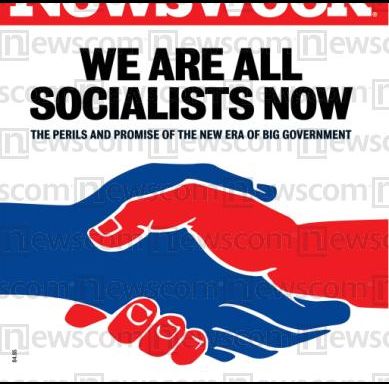The dynamic of upheaval in the Democratic Party that would follow a Sanders win in Iowa and New Hampshire, and the resulting increase in public momentum will be entirely different, and much more complicated, than what happened in 2008.
Hillary, of course, entered this contest with an enormous advantage in money, organization, and media. She is the preferred candidate -- Democrat or Republican -- of the ruling class, and the capitalist elite that pays her $200,000 for a speech will give her all the money she needs to become President. She has a political organization with decades of experience. Though despised by the conservative media, she is looked on with great favor by the liberal commentariat, which has, also for decades, been anticipating her ascension as the first female president, another jewel in the crown of equal-opportunity imperialism. As Bernie has emerged as unexpectedly threatening, we have already seen a slew of Very Serious liberal people-- Paul Krugman, Ezra Klein, Joan Walsh, etc.-- arise to proclaim her superiority to Sanders. Also, she's not a socialist.
Conventional wisdom has it that this array of assets poses a seemingly insurmountable obstacle to any challenger.
Bernie Sanders, however, turns out to be a much stronger candidate than anyone expected. He has been able to raise considerable amounts of money from the grassroots, including over two million online contributors. Although it's unlikely to have sufficient depth for a longer fight against Hillary, his fundraising has been more than adequate for the early primaries. His organization in Iowa and New Hampshire has been quite good. He's campaigned enthusiastically, and has made nary a false step. Despite Debbie Wasserman Schultz's efforts to limit and marginalize debates, and the media's insistence that Hillary wins every one, Sanders's support continues to increase. He draws huge, enthusiastic crowds, and his poll numbers climb every week.
His biggest strength, of course, is the enthusiasm he generates among the party's base. The conventional wisdom wants to attribute this to young, millennial voters, but it goes beyond that. Bernie is seen, with good reason, as an honest, transparent, fair-minded person who has a long, open-book, record of fighting for real progressive causes. He is perceived as unbeholden to corporate and monied interests, and is generally committed to what he calls "democratic socialism." In a nutshell, Hillary flies on private jets and defends the private health insurance industry; Bernie flies coach and fights for single-payer. In today's America, that's the kind of difference that gives Sanders a wide appeal to the whole party constituency, not just to millennials -- and, in fact, not just to Democrats. Also, he's a socialist. Turns out, to the utter shock of the Democratic Party establishment and the media that tries to ignore him, that Bernie's socialism may be more of an asset than Hillary's capitalism.
One might say that Bernie's biggest strength derives from Hillary's weakness. Let's not forget that there's a wild card in play that could blow up the Clinton campaign in a minute: her private email server. 2 But her most politically substantive problem is that too many Democratic voters are sick and tired -- disgusted really -- with the betrayal of their values that Clintonite neoliberalism and "We came. We saw. He died." militarism represents. The contradictions between the party establishment and the base are becoming too hard to hide or to swallow, and Democrats are repelled by the idea of voting for a Republican-Lite again. And with every word from her, and Chelsea, and Paul Krugman denouncing the foolishness and naivete of Sanders's single payer and socialism, they become even more convinced that they will not. Too many progressives have seen the devastating left critiques of Hillary's career in books like Doug Henwood's My Turn (see essay here) and Diana Johnstone's Queen of Chaos. Even mainstream commentators perceive that "Hillary Clinton's desultory campaign is sinking."
Everything Clinton represents in the Democratic Party, every scrap of neo-libservatism that Democratic voters have been force-fed for the past twenty years, is being vomited up by large swaths of its base. No matter what happens in the primary, there are going to be a lot of erstwhile Democratic voters who will just not pull a lever for Hillary. This is the fundamental dynamic that is now unfolding with the Sanders campaign, it is taking on some serious momentum, and it will be very hard to reverse.
Be Careful What You Ask For





